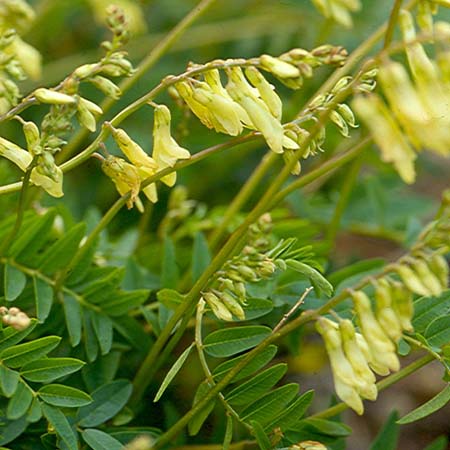Astragalus membranaceus

Common Names: Astragalus, Astragalus membranaceus, Milk Vetch, Huang qi, Huangchi, Ogi, Mongolian milkvetch, Membranous milk vetch, Radix Astragali, Beiqi, Astragale, Astragale de Chine, Chinese milkvetch, Astragalus root, Global, Latin: Astragalus membranaceus, Traditional Chinese: 黄芪
Latin Name: Astragalus membranaceus
Origin: Africa, Asia, Europe, North America
Short Introduction
It is recommended to soak the seeds in water for 24 hours before sowing. Grow the plant in full sun, in neutral or slightly alkaline soil that is very light and well-drained.
Detailed Description
Astragalus is a celebrated immune booster that provides life force, vitality, and the resilience to withstand physical and psychological stress. The use of astragalus root extract as a health tonic is documented for over 4000 years.
Botanical Information
Astragalus comprises annual or perennial herbs, subshrubs, and shrubs. The plants are covered with simple or forked hairs, sometimes featuring protective or aromatic glands on leaf stipules or derivatives. Leaves are either odd- or even-pinnate, generally grouped in 12 to 16 pairs along the branch. In shrubbier forms, the petioles may persist and develop into spines. Stipules are typically green, often fused and sheathing the stem. Astragalus has raceme inflorescences that vary in structure and bear several stalked flowers, found in shades of yellow, white, blue, purple, or occasionally bicolored. The bell-shaped calyx ends with five teeth. Its pods are highly variable—thin, elongated, usually leathery but rarely hard and nut-like, sometimes inflated. They may either split open or remain closed, containing kidney-shaped seeds.
Origin and Distribution
The genus Astragalus is one of the largest in the plant kingdom, with around 3000 species. It is most widespread across the entire Northern Hemisphere. About one-sixth of astragalus species are found in North America, where they appear as perennials or subshrubs; the rest are distributed across Europe, Asia, and Africa, where shrubs predominate. Astragalus species are steppe plants, thriving in prairies and semi-desert areas, as they are sun-loving and adapt to well-drained soils and drought. Asian species are often spiny, with variably modified leaves to suit the climate.
In the Czech Republic, there are about 7 species of astragalus, with Sweetleaf Milk Vetch being the most common, typically found in lowlands and foothills. In Europe, approximately 140 species have been identified, mostly growing in the dry regions of the Mediterranean and Russia.
Usage / Dosage
Modern scientific studies recognize the ability of astragalus root extract to stabilize and strengthen various immune system processes, especially against viral and bacterial respiratory infections.
Astragalus is also significant in the management of various oncological conditions, as its astragalans inhibit tumor cells’ defensive mechanisms against the body’s immune system.
Astragalus shows immune-boosting effects comparable to echinacea, and in some instances, may be even more effective. It also exerts notable antioxidant effects.
Membranous milk vetch is an herbal tonic (superfood) with a usage safety record dating back some 4000 years.
As a dietary supplement, astragalus can effectively compete with many multivitamin and mineral products, since it naturally contains a wide range of key amino acids, trace elements, and unique compounds (see 'Active Compounds' section). It is an excellent source of nutrients, making it beneficial as a supplement to help combat stressors of modern life. Recently, astragalus has become recognized as a “plant of the future” because it contains cycloastragenol, a compound believed to support cellular anti-aging (via CD4 and CD8 lymphocyte activity). These mechanisms contribute to overall resilience, and also improve the respiratory system, especially in cases of persistent, irritating, or allergic cough.
Extracts of astragalus and related Fabaceae species are often formulated into supplements for postmenopausal women. In men, it supports reproductive health by boosting sperm activity and count.
Astragalus contains substances related to those in ginseng that help stabilize blood pressure and promote a more active cardiovascular system. Not only does it strengthen already weakened organs and vessels, but it may also help prevent future cardiovascular problems.
In traditional Chinese medicine, astragalus has been used to treat acute and chronic respiratory tract infections, night sweats, fatigue, weakness, poor appetite, and diarrhea.
Chinese practitioners consider astragalus to be a strengthening herb used to make tonics for young people and convalescent patients. According to Chinese philosophy, Astragalus increases resistance to disease and balances vital energy (Qi). It is especially recommended for frequent colds and allergy-related conditions.
Active Compounds
The most potent bioactive compound is believed to be 4-hydroxy-3-methoxy isoflavone acid, which is extensively studied. Astragalus species also contain cyclitols (such as pinitol), pyridine alkaloids in the seeds, and mildly toxic canavanine.
Sweetleaf Milk Vetch is named for its triterpenoid saponin content, similar to that of licorice (glycyrrhizin). The root of Astragalus membranaceus further contains isoflavonoids, isoflavone derivatives, saponins (astragalosides), steroids, and essential organic and inorganic nutrients (amino acids, minerals, etc.).
Traditional Dosage
Herbal extract from astragalus root acts as an adaptogen (helping the body adapt to environmental changes) and aids in restoring physical and mental energy. It also harmonizes blood sugar levels. Wash and grate or crush the root into small pieces, then macerate in a minimal amount of a 1:1 water-ethanol mixture (using 60% pharmaceutical alcohol) for 1–2 days. Filter the liquid. 6.3g of this extract is further diluted with the same 1:1 alcohol-water solution (or more water) to a total volume of 100ml.
The dosage for this solution is 15–25 drops, twice daily. It should not be given to children without medical supervision or recommendation.
Standardized extract: 250–500mg, 3–4 times daily.
Decoction (strong tea): Use 3–6g dried root, 3 times daily.
Liquid extract in 25% ethanol (1:1): 2–4ml, 3 times daily.
Powdered root: 250–500mg, 3–4 times daily.
An ointment containing 10% astragalus should not be applied to open wounds.
Tincture with 30% ethanol (1:5): 20–60 drops, 3 times daily.



